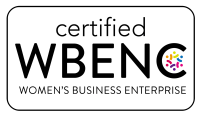Digital marketing encompasses a mind-boggling and growing array of platforms and channels to reach consumers – combining website marketing, search engine optimization (SEO), content marketing, social media, e-mail marketing, display advertising, content automation, influencer marketing, pay-per-click (PPC) advertising, video marketing, and more. Used in combination with traditional marketing channels, it’s a lot to juggle… even for the most seasoned marketing professional.
This crowded landscape brings unique challenges: How do you keep up? How do you use all of these channels to effectively market your products and services while still staying focused on running your business? How do you ensure you’re capturing and using data effectively to learn more about your customer’s journey? And how do you stay ahead of the competition?
This is where a digital marketing strategy comes in, streamlining all of the complicated moving parts to give your marketing efforts a competitive edge.
What does a digital marketing strategy do?
It helps focus and identify your goals
Growing your company’s online presence means more than having a goal of adding more followers on social channels.. A well-defined digital marketing strategy helps to create an effectively-targeted action plan with clearly defined goals and measurements for success.
It draws a roadmap for your presence in the online marketplace
A digital marketing strategy employs data-driven insights to identify and focus on the channels that will reach your potential customers as well as quickly uncover which channels would be a waste of effort and money. Understanding of your customer’s habits and behaviors helps you to get the basics right and draws a roadmap with which to navigate your strategic position in the online marketplace.
It identifies your online market share and value proposition
Online customers do not respond like traditional customers. A digital marketing strategy gives specific insight into your customers behaviors and outlines what services and products they actually want. These insights can shed light on entire market segments that you did not even consider. It also defines the value proposition that makes you stand out online and fits the marketplace that’s right for your company’s offerings.
It increases efficiency, synergy, and reach
Digital and traditional marketing may seem different, but they are often working to solve many of the same challenges, even when the people involved are working in their own distinct specialties. Even in small companies division of labor can often lead to duplicate efforts and initiatives as well as mixed communication messages.
A coordinated digital strategy puts everyone on the same page and aligns overall efforts. This can be dramatically more cost effective, as the digital strategy process identifies marketing approaches and tools that are not optimized, or even wasteful, saving time, money, and resources.
A multi-channel strategy uses different marketing channels to solve different problems and to extend a company’s reach and visibility, reducing redundancy and creating a collective effort to reach the entire market efficiently.
It enables you to adapt to pivot and seize opportunities as they arise
Having a strategy in place allows an agile approach that provides a distinct advantage in adapting to a constantly-changing environment. Besides helping with goal setting, it includes built-in checkpoints for managing resources in response to both analytic data and environmental opportunities.
A strategy also gives you the insight to test and experiment new approaches, the information needed to eliminate methods that do not work, and the ability to adjust your strategy to use the methods that work best, when they work best, and where they work best.
It puts you toe-to-toe with competitors
Your competitors are already online, and are already working to maximize their presence and take your potential customers. This means each day you are not optimizing your own digital strategy and building your online visibility you are losing potential customers to your competitors.
In closing
Building and implementing a digital marketing strategy doesn’t need to be complicated or expensive: begin by identifying what you would like to accomplish and then selecting a few tools and platforms that fit within your current budget. And stay flexible! A good online marketing strategy is versatile by design, evolving as you gain insights and enabling you to adapt to an ever-changing marketplace.
Let us help!
We’d love to talk about your digital marketing strategy.

